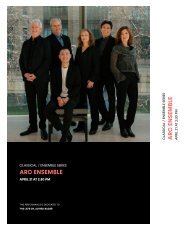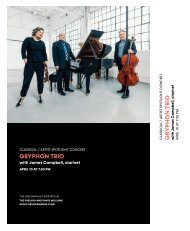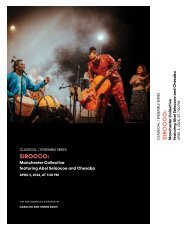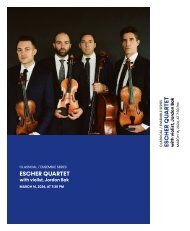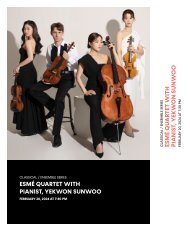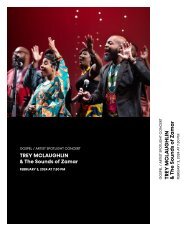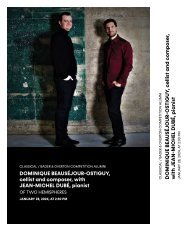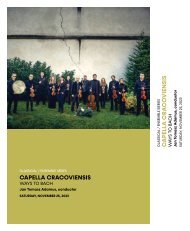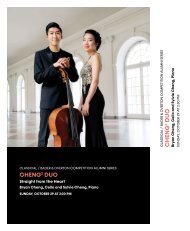Camilla Tilling and Emanuel Ax | October 31, 2023 | House Program
- No tags were found...
Create successful ePaper yourself
Turn your PDF publications into a flip-book with our unique Google optimized e-Paper software.
CLASSICAL / VIRTUOSI SOLOIST SERIES<br />
CAMILLA TILLING, SOPRANO<br />
AND EMANUEL AX, PIANO<br />
Jenny Lind: Love <strong>and</strong> Lieder<br />
TUESDAY, OCTOBER <strong>31</strong> AT 7:30 PM<br />
CLASSICAL / VIRTUOSI SOLOIST SERIES<br />
CAMILLA TILLING, SOPRANO<br />
AND EMANUEL AX, PIANO<br />
Jenny Lind: Love <strong>and</strong> Lieder<br />
TUESDAY, OCTOBER <strong>31</strong> AT 7:30 PM
CLASSICAL / VIRTUOSI SOLOIST SERIES<br />
CAMILLA TILLING, SOPRANO<br />
AND EMANUEL AX, PIANO<br />
PROGRAM<br />
FELIX MENDELSSOHN (1809-1847) Hexenlied, Op. 8, No. 8<br />
Die Liebende schreibt, Op. 86, No. 3<br />
Allnächtlich im Traum, Op. 86, No. 4<br />
Der Mond, Op. 86, No. 5<br />
Blumenstrauss, Op. 47, No. 5<br />
Frühlingslied, Op. 47, No. 3<br />
Pagenlied, Op. Posth.<br />
Auf Flügeln des Gesanges, Op. 34, No. 2<br />
FREDERIC CHOPIN (1810-1849)<br />
FREDERIC CHOPIN <strong>and</strong><br />
PAULINE VIARDOT (1821-1910)<br />
Nocturne for solo piano<br />
Mazurka for solo piano<br />
Mazurka, Op. 33, No. 2, Aime-moi<br />
INTERMISSION<br />
ROBERT SCHUMANN (1810-1856)<br />
Arabeske, Op. 18, for solo piano<br />
Lieder und Gesänge aus “Wilhelm Meister”, Op. 98A<br />
Heiss mich nicht reden, heiss mich schweigen [No. 5]<br />
Nur wer die Sehnsucht kennt [No. 3]<br />
So lasst mich scheinen [No. 9]<br />
Singet nicht in Trauertönen [No. 7]<br />
Liederalbum für die Jugend, Op. 79<br />
Er ist‘s [No. 23]<br />
Marienwürmchen [No. 13]<br />
Der Himmel hat eine Träne geweint, Op. 37, No. 1<br />
Der Nussbaum, Op 25, No. 3<br />
FrühlingsNacht, Op. 39, No. 12<br />
An den Sonnenschein, Op 36, No. 4
PROGRAM NOTES<br />
The thread running through this concert is<br />
the 19th-century singer, Jenny Lind (1820-<br />
1887), affectionately known as the “Swedish<br />
Nightingale.” Swedish soprano <strong>Camilla</strong> <strong>Tilling</strong> has<br />
felt a connection to Jenny Lind since receiving<br />
a scholarship named in Lind’s honour when<br />
she was 24. In 2020, <strong>Tilling</strong> curated tonight’s<br />
program to celebrate the 200th anniversary of<br />
Lind’s birth, by focussing specifically on Lind’s<br />
passion for German Lieder. As <strong>Tilling</strong> writes, “…<br />
the composers on this program not only featured<br />
on Jenny’s famed US tour that was promoted<br />
by the showman, P.T. Barnum, but were also<br />
linked to Jenny through musical collaboration<br />
<strong>and</strong> friendship. Indeed, the Schumanns were<br />
such dear friends–Jenny regularly performed<br />
works by Robert—<strong>and</strong> she would on occasion<br />
join Clara Schumann (a most celebrated concert<br />
pianist <strong>and</strong> tourer at this time) on stage to bolster<br />
audience numbers at Clara’s concerts. Through<br />
the Schumanns, Jenny was introduced to both<br />
Chopin–it is rumoured she even gifted him a<br />
large sum to help him in his final years—<strong>and</strong><br />
Mendelssohn with whom Jenny had a supposedly<br />
turbulent romantic entanglement.”<br />
Mendelssohn’s Opus 8, No. 8, “Witches’ Song,”<br />
uses fiery piano octaves <strong>and</strong> a demonic energy to<br />
convey Beelzebub <strong>and</strong> his witches <strong>and</strong> certainly<br />
seems highly appropriate for this concert taking<br />
place on Halloween. The next three Opus 86<br />
Lieder are taken from a six-song collection that<br />
was assembled posthumously, noting that all of<br />
the songs in this collection have a more singular<br />
focus on love poetry than the variety of songs<br />
that the composer himself usually assembled<br />
for publication: “The Beloved Writes” (No. 3), is<br />
a desperate love letter to someone who has yet<br />
to return their advances; “Nightly in My Dreams”<br />
(No. 4), describes an unsatisfied relationship<br />
where the love’s vision is only present in dreams;<br />
<strong>and</strong> “The Moon” (No. 6), personifies the love<br />
interest as the moon, with pleas to have it<br />
lighten the night. Of the concluding set of<br />
four Mendelssohn songs, the last one, “On<br />
Wings of Song,” is one of the composer’s<br />
most recognizable melodies. It might also<br />
be familiar to listeners from the 1954 version<br />
that Doris Day recorded under the title,<br />
“Til My Love Comes to Me.”<br />
French mezzo-soprano Pauline Viardot, born a<br />
year later than Jenny Lind, also had an illustrious<br />
career. She counted amongst her friends, Chopin,<br />
who in addition to advising her on piano playing<br />
<strong>and</strong> composing, gave her approval to rework<br />
some of his solo piano mazurkas into songs. The<br />
piano part in these arrangements generally stays<br />
true to Chopin’s originals but, as you will hear in<br />
Opus 33, No. 2, Viardot’s flirtatious text <strong>and</strong> vocal<br />
delivery, take this Polish dance to another level.<br />
Schumann’s Opus 98A adds music to a total<br />
of nine songs sung by different characters in<br />
Goethe’s eight-part novel, Wilhelm Meister,<br />
noting that Opus 98B also uses the same source<br />
material in a cantata-type work titled, Requiem<br />
for Mignon. The two Opus 79 songs are exquisite<br />
miniatures from his “Song Album for the Young.”<br />
with No. 23 (“Spring is Here”) employing a<br />
piano part that generates spaces for the singer’s<br />
beautiful high notes to shine through, <strong>and</strong><br />
No. 13 (Ladybug), sets to music the German<br />
equivalent of “Ladybug, Ladybug, fly away<br />
home….” In 1840, Robert Schumann composed<br />
over 130 songs, a truly prolific year. The focus<br />
on so much romantic poetry that year can be<br />
traced to the legal battle that he <strong>and</strong> Clara had<br />
won over her father’s refusal to allow them to<br />
marry. The final four songs on this program<br />
are from this “year-of-song” with the period’s<br />
happiness heard most prominently in Op. 39,<br />
No. 12 (Spring Night), which builds repeated<br />
chordal patterns to a powerful ending as the<br />
poem highlights the many aspects of spring<br />
that are crying out, “She is yours!”<br />
All of the composers on tonight’s program were<br />
highly skilled pianists <strong>and</strong> their underst<strong>and</strong>ing of<br />
the keyboard is often used to generate textures<br />
between the two h<strong>and</strong>s that can be remarkably<br />
intricate <strong>and</strong> complex. The opportunity to hear<br />
some of the solo piano music performed in the<br />
context of a vocal recital, helps to emphasize<br />
the songlike quality of their instrumental<br />
melodic writing, as can be heard in the very<br />
operatic melodic focus of Chopin’s Nocturnes<br />
<strong>and</strong> the lyrical flowering of the coda that ends<br />
Schumann’s Arabeske.<br />
©<strong>2023</strong> by John Burge for the Isabel
ABOUT CAMILLA TILLING<br />
Undoubtedly one of Sweden’s most remarkable<br />
voices, <strong>Camilla</strong> <strong>Tilling</strong>’s beguiling tone <strong>and</strong> unfailing<br />
musicality have secured her position as a firm<br />
favourite with conductors, audiences <strong>and</strong> critics<br />
alike across a career that has now spanned more<br />
than two decades. She has been a steady presence<br />
on the world’s leading opera, concert <strong>and</strong> recital<br />
stages while simultaneously building an impressive<br />
discography that includes orchestral works by<br />
Haydn with Bernard Haitink, H<strong>and</strong>el <strong>and</strong> Purcell with<br />
Emmanuelle Haïm, Grieg with Paavo Järvi, Brahms<br />
with Marek Janowski <strong>and</strong> Cherubini with Riccardo<br />
Muti in addition to recital collections of Gluck,<br />
Mozart, Strauss, Schumann, Grieg <strong>and</strong> many other<br />
composers.<br />
<strong>Tilling</strong> st<strong>and</strong>s out as one of the world’s most soughtafter<br />
concert performers, collaborating regularly<br />
with today’s foremost conductors including recent<br />
appearances under Gustavo Dudamel with both<br />
Het Concertgebouw Orkest <strong>and</strong> Los Angeles<br />
Philharmonic Orchestra in Mahler’s Symphony<br />
No.4, under Esa-Pekka Salonen with London<br />
Philharmonia Orchestra in Schoenberg’s Gurrelieder,<br />
with Gian<strong>and</strong>rea Noseda <strong>and</strong> Washington National<br />
Symphony Orchestra in Beethoven’s Symphony<br />
No.9, with Omer Meir Welber <strong>and</strong> Orchestre national<br />
de France in Dutilleux’s Correspondances <strong>and</strong><br />
under François-Xavier Roth with London Symphony<br />
Orchestra in Berg’s Sieben frühe Lieder. <strong>Tilling</strong><br />
has toured extensively in Peter Sellar’s stagings of<br />
Bach’s St Matthew Passion <strong>and</strong> St John Passion with<br />
Berliner Philharmoniker <strong>and</strong> Sir Simon Rattle <strong>and</strong> she<br />
enjoyed an enduring collaboration with the late Sir<br />
Bernard Haitink under whose baton she sang her first<br />
Beethoven, Missa Solemnis at Teatro alla Scala <strong>and</strong><br />
she was the Strauss soprano of choice for his historic<br />
final concerts with Radio Filharmonish Orkest at<br />
Amsterdam’s Concertgebouw in 2019.<br />
Recent operatic highlights include the Governess<br />
(The Turn of the Screw) at Glyndebourne<br />
Festival, Euridice (Orfeo ed Euridice) at Salzburg<br />
Mozartwoche, Donna Clara (Der Zwerg) at<br />
Bayerische Staatsoper, Debussy’s La Damoiselle<br />
élue at Madrid’s Teatro Real <strong>and</strong> Blanche de la<br />
Force (Dialogues des Carmélites), Suor Angelica<br />
<strong>and</strong> Contessa (Le nozze di Figaro) at Royal Swedish<br />
Opera. As Mélis<strong>and</strong>e (Pelléas et Mélis<strong>and</strong>e) <strong>Tilling</strong> is<br />
in regular dem<strong>and</strong> with recent productions at Teatro<br />
Real Madrid, Semperoper Dresden, Finnish National<br />
Opera <strong>and</strong> with Los Angeles Philharmonic Orchestra<br />
under Esa-Pekka Salonen.<br />
Last season <strong>Camilla</strong> <strong>Tilling</strong> exp<strong>and</strong>ed her already<br />
extensive <strong>and</strong> varied repertoire with the premiere<br />
of Daniel Nelson’s Chaplin Songs with Swedish<br />
Radio Symphony Orchestra under Andrew Manze,<br />
Osvaldo Golijov’s Three Songs with David Danzmayr<br />
conducting the Oregon Symphony Orchestra <strong>and</strong><br />
Irgen-Jensens’ song cycle Japanischer Frühling with<br />
Christian Blex <strong>and</strong> Karajan-Akademie of Berliner<br />
Philharmoniker, a work she repeats in the current<br />
season under Tabita Berglund with Kristians<strong>and</strong><br />
Symfoniorkester. Elsewhere in the current season,<br />
<strong>Camilla</strong> <strong>Tilling</strong>’s varied commitments include<br />
performances of Janacek’s Glagolitic Mass under the<br />
baton of Rafael Payare with Orchestre Symphonique<br />
de Montreal, Mahler’s Symphony No.4 with Perry So<br />
<strong>and</strong> Navarra Symphony Orchestra <strong>and</strong> Mendelssohn’s<br />
oratorio Paulus with Orquesta y Coro Nacionales de<br />
Espana under Masaaki Suzuki.<br />
ABOUT EMANUEL AX<br />
Born to Polish parents in what is today Lviv, Ukraine,<br />
<strong>Emanuel</strong> <strong>Ax</strong> moved to Winnipeg, Canada, with<br />
his family when he was a young boy. Mr. <strong>Ax</strong> made<br />
his New York debut in the Young Concert Artists<br />
Series, <strong>and</strong> in 1974 won the first Arthur Rubinstein<br />
International Piano Competition in Tel Aviv. In 1975<br />
he won the Michaels Award of Young Concert Artists,<br />
followed four years later by the Avery Fisher Prize.<br />
Mr. <strong>Ax</strong> has been a Sony Classical exclusive recording<br />
artist since 1987 <strong>and</strong> following the success of<br />
the Brahms Trios with Kavakos <strong>and</strong> Ma, the trio<br />
launched an ambitious, multi-year project to record<br />
all the Beethoven Trios <strong>and</strong> Symphonies arranged<br />
for trio of which the first two discs have recently<br />
been released. He has received GRAMMY® Awards<br />
for the second <strong>and</strong> third volumes of his cycle of<br />
Haydn’s piano sonatas. He has also made a series of<br />
Grammy-winning recordings with cellist Yo-Yo Ma<br />
of the Beethoven <strong>and</strong> Brahms sonatas for cello <strong>and</strong><br />
piano. In the 2004/05 season Mr. <strong>Ax</strong> contributed<br />
to an International EMMY® Award-Winning BBC<br />
documentary commemorating the Holocaust that<br />
aired on the 60th anniversary of the liberation of<br />
Auschwitz. In 2013, Mr. <strong>Ax</strong>’s recording Variations<br />
received the Echo Klassik Award for Solo Recording<br />
of the Year (19th Century Music/Piano).<br />
Mr. <strong>Ax</strong> is a Fellow of the American Academy of<br />
Arts <strong>and</strong> Sciences <strong>and</strong> holds honorary doctorates<br />
of music from Skidmore College, New Engl<strong>and</strong><br />
Conservatory of Music, Yale University, <strong>and</strong> Columbia<br />
University. For more information about Mr. <strong>Ax</strong>’s<br />
career, please visit www.<strong>Emanuel</strong><strong>Ax</strong>.com.
TEXTS AND TRANSLATIONS<br />
ANDRES MAIENLIED ‘HEXENLIED’<br />
Mendelssohn / Hölty<br />
De Schwalbe fliegt,<br />
Der Früling siegt,<br />
Und spendet uns Blumen zum Kranze!<br />
Bald huschen wir<br />
Lies’ aus der Tür,<br />
Und fliegen zum prächtigen Tanze!<br />
Ein schwarzer Bock,<br />
Ein Besenstock,<br />
Die Ofengabel, der Wocken,<br />
Reißt uns geschwind,<br />
Wie Blitz und Wind,<br />
Durch sausende Lüfte zum Brocken!<br />
Um Beelzebub<br />
Tanzt unser Trupp,<br />
Und küßt ihm die kralligen Hände!<br />
Ein Geisterschwarm<br />
Faßt uns beim Arm,<br />
Und schwinget im Tanzen die Brände!<br />
Und Beelzebub<br />
Verheißt dem Trupp<br />
Der Tanzenden Gaben auf Gaben:<br />
Sie sollen schön<br />
In Seide gehn<br />
Und Töpfe voll Goldes Sich graben!<br />
Ein Feuerdrach’<br />
Umflieget das Dach<br />
Und bringet uns Butter und Eier:<br />
Die Nachbarn dann sehn<br />
Die Funken wehn,<br />
Und schlagen ein Kreuz vor dem Feuer.<br />
Die Schwalbe fliegt<br />
Der Frühling siegt,<br />
Die Blumen erblühen zum Kranze.<br />
Bald huschen wir<br />
Leis’ aus der Tur,<br />
Juchheisa! zum prächtigen Tanze!<br />
ANOTHER KIND OF MAY SONG ‘Witches’ Song’<br />
English Translation by Richard Stokes<br />
Swallows are flying,<br />
Spring’s triumphant,<br />
Dispensing flowers for wreaths!<br />
Soon we’ll flit<br />
Quietly outside,<br />
And fly to the splendid dance!<br />
A black goat,<br />
A broomstick,<br />
The furnace rake, the distaff<br />
Whisk us on our way,<br />
Like lightning <strong>and</strong> wind,<br />
Through whistling gales to the Brocken!<br />
Our coven dances<br />
Round Beelzebub<br />
And kisses his claw-like h<strong>and</strong>s!<br />
A ghostly throng<br />
Seizes our arms,<br />
Waving firebr<strong>and</strong>s as they dance!<br />
And Beelzebub<br />
Pledges the throng<br />
Of dancers gift after gift:<br />
They shall be dressed<br />
In beautiful silk<br />
And dig themselves pots full of gold!<br />
A fiery dragon<br />
Flies round the roof<br />
And brings us butter <strong>and</strong> eggs:<br />
The neighbours catch sight<br />
Of the flying sparks,<br />
And cross themselves for fear of the fire.<br />
Swallows are flying,<br />
Spring’s triumphant, Flowers are blooming for<br />
wreaths.<br />
Soon we’ll flit<br />
Quietly outside —<br />
Tally-ho to the splendid dance!
DIE LIEBENDE SCHREIBT<br />
Mendelssohn / Goethe<br />
Ein Blick von deinen Augen in die meinen,<br />
Ein Kuß von deinem Mund auf meinem Munde,<br />
Wer davon hat, wie ich, gewisse Kunde, Mag<br />
dem was <strong>and</strong>ers wohl erfreulich scheinen?<br />
Entfernt von dir, entfremdet von den Meinen,<br />
Da führ ich die Gedanken in die Runde, Und<br />
immer treffen sie auf jene Stunde, Die einzige;<br />
da fang ich an zu weinen.<br />
Die Träne trocknet wieder unversehens:<br />
Er liebt ja, denk ich, her in diese Stille,<br />
O solltest du nicht in die Ferne reichen?<br />
Vernimm das Lispeln dieses Liebewehens;<br />
Mein einzig Glück auf Erden ist dein Wille,<br />
Dein freundlicher, zu mir; gib mir ein Zeichen!<br />
THE BELOVED WRITES<br />
English Translation by Richard Stokes<br />
One glance from your eyes into mine,<br />
One kiss from your mouth onto my mouth,<br />
Who, like me, is assured of these,<br />
Can he take pleasure in anything else?<br />
Far from you, estranged from my family,<br />
I let my thoughts rove constantly,<br />
And always they fix on that hour,<br />
That precious hour; <strong>and</strong> I begin to weep.<br />
Suddenly my tears grow dry again:<br />
His love, I think, he sends into this silence,<br />
And should you not reach out into the distance?<br />
Receive the murmurs of this loving sigh;<br />
Your will is my sole happiness on earth,<br />
Your kind will; give me a sign!<br />
ALLNÄCHTLICH IM TRAUME SER ICH DICH<br />
Mendelssohn / Heine<br />
Allnächtlich im Traume seh’ ich dich<br />
Und sehe dich freundlich grüssen,<br />
Und laut aufweinend stürz’ ich mich<br />
Zu deinen süssen Füssen.<br />
Du siehest mich an wehmütiglich<br />
Und schüttelst das blonde Köpfchen;<br />
Aus deinen Augen schleichen Sich Die<br />
Perlentränentröpfchen.<br />
Du sagst mir heimlich ein leises Wort<br />
Und gibst mir den Strauss von Zypressen.<br />
Ich wache auf, und der Strauss ist fort,<br />
Und’s Wort hab’ ich vergessen.<br />
NIGHTLY IN MY DREAMS<br />
English Translation by Richard Stokes<br />
Nightly in my dreams I see you,<br />
And see your friendly greeting,<br />
And weeping loud, I hurl myself<br />
Down at your sweet feet.<br />
Wistfully you look at me,<br />
Shaking your fair little head;<br />
Stealing from your eyes<br />
Flow little tears of pearl.<br />
You whisper me a soft word<br />
And h<strong>and</strong> me a wreath of cypress.<br />
I wake, the wreath is gone,<br />
And I cannot remember the word.<br />
DER MOND<br />
Mendelssohn / Geibel<br />
Mein Herz ist wie die dunkle Nacht,<br />
Wenn alle Wipfel rauschen;<br />
Da steigt der Mond in voller Pracht<br />
Aus Wolken sacht, Und sieh!<br />
Der Wald verstummt in tiefem Lauschen.<br />
Der Mond, der lichte Mond bist du:<br />
In deiner Liebesfülle<br />
Wirf einen, einen Blick mir zu<br />
Voll Himmelsruh’,<br />
Und sieh! dies ungestüme Herz wird stille<br />
THE MOON<br />
English Translation by Richard Stokes<br />
My heart is like the dark night,<br />
When all the tree-tops rustle;<br />
The moon rises in full splendour<br />
Gently from the clouds — <strong>and</strong> see!<br />
The wood falls silently, raptly listening<br />
You are the moon, the shining moon:<br />
In the fullness of your love,<br />
Throw me one, one single glance<br />
Of brimming heavenly peace - <strong>and</strong> see!<br />
This tempestuous heart is soothed.
DER BLUMENSTRAUSS<br />
Mendelssohn / Klingeman<br />
Sie w<strong>and</strong>elt im Blumengarten<br />
Und mustert den bunten Flor,<br />
Und alle die Kleinen warten<br />
Und schauen zu ihr empor.<br />
„Und seid ihr denn Frühlingsboten,<br />
Verkündend was stets so neu,<br />
So werdet auch meine Boten<br />
An ihn, der mich liebt so treu.”<br />
So überschaut sie die Habe<br />
Und ordnet den lieblichen Strauss,<br />
Und reicht dem Freunde die Gabe,<br />
Und weicht seinem Blicke aus.<br />
Was Blumen und Farben meinen,<br />
O deutet, o fragt das nicht,<br />
Wenn aus den Augen der Einen<br />
Der süsseste Frühling spricht.<br />
THE POSY<br />
English Translation by Richard Stokes<br />
She walks in the flower garden<br />
And gazes at the colourful blooms,<br />
And all the little buds wait<br />
And look up at her.<br />
‘If you be messengers of spring,<br />
Announcing what is always so new,<br />
Then be my messengers as well<br />
To him who loves me so true.’<br />
Thus she surveys all she owns<br />
And fashions a lovely posy,<br />
And gives it to her friend.<br />
And averts her gaze.<br />
Do not ask the meaning<br />
Of these colours <strong>and</strong> flowers,<br />
When from the eyes of the one you love<br />
Gazes the sweetest spring.<br />
FRÜHLINGSLIED<br />
Mendelssohn / Lenau<br />
Durch den Wald den dunkeln,<br />
Geht holde Frühlingsmorgenstunde,<br />
Durch den Wald von Himmel weht<br />
Eine leise Liebeskunde.<br />
Selig lauscht der grüne Baum,<br />
Und er taucht mit allen Zweigen<br />
In den schönen Frühlingstraum,<br />
In den vollen Lebensreigen.<br />
Blüht ein Blümchen irgendwo,<br />
Wird’s vom hellen Tau getränket,<br />
Das Versteckte zittert froh,<br />
Dass der Himmel sein gedenket.<br />
In geheimer Laubesnacht,<br />
Wird des Vogels Herz getroffen<br />
Von der Liebe Zaubermacht,<br />
Und er singt ein süsses Hoffen.<br />
All’ das frohe Lenzgeschick<br />
Nicht ein Wort des Himmels kündet,<br />
Nur sein stummer, warmer Blick<br />
Hat die Seligkeit entzündet.<br />
Also in den Winterharm,<br />
Der die Seele hielt bezwungen,<br />
Ist dein Blick mir, still und warm,<br />
Frühlingsmächtig eingedrungen.<br />
SPRING SONG<br />
English Translation by Richard Stokes<br />
Spring’s glorious morning hour<br />
Passes through the dark wood,<br />
A gentle message of love<br />
Blows from heaven through the wood.<br />
The green tree listens in rapture<br />
And dips all its boughs<br />
Into the beautiful spring dream,<br />
Into the full dance of life.<br />
Wherever a small flower blooms,<br />
It is watered by the bright dew,<br />
The hidden flower quivers with joy<br />
That heaven has remembered it.<br />
In the secret darkness of the leaves<br />
The bird’s heart is struck<br />
By the magic power of love,<br />
And it sings of its sweet hope.<br />
All these joyful spring messages<br />
Speak not a single word of heaven;<br />
Only its silent <strong>and</strong> ardent glance<br />
Has kindled happiness.<br />
Thus in this grim winter,<br />
Which kept my soul subdued,<br />
A quiet <strong>and</strong> ardent glance<br />
Has pierced me with the power of spring.
PAGENLIED<br />
Mendelssohn/Eichendorff<br />
Wenn die Sonne lieblich schiene<br />
Wie in Welschl<strong>and</strong> lau und blau,<br />
Ging’ ich mit der M<strong>and</strong>oline<br />
Durch die überglänzte Au’.<br />
In der Nacht das Liebchen lauschte<br />
An dem Fenster süß verwacht,<br />
Wünschte mir und ihr, uns beiden,<br />
Heimlich eine schöne Nacht.<br />
Wenn die Sonne lieblich schiene<br />
Wie in Welschl<strong>and</strong> lau und blau,<br />
Ging’ ich mit der M<strong>and</strong>oline<br />
Durch die überglänzte Au’.<br />
PAGE’S SONG<br />
English translation by Richard Stokes<br />
If the sun were to shine gently<br />
As in Italy, from warm, blue skies,<br />
I would go with my m<strong>and</strong>oline<br />
Through the sun-drenched meadow.<br />
In the night my love would listen<br />
From her window, sweetly awake,<br />
And she would wish both of us,<br />
In secret, a lovely night.<br />
If the sun were to shine gently<br />
As in Italy, from warm, blue skies,<br />
I would go with my m<strong>and</strong>oline<br />
Through the sun-drenched meadow.<br />
AUF FLÜGELN DES GESANGES<br />
Mendelssohn/Heine<br />
Auf Flügeln des Gesanges<br />
Herzliebchen, trag’ ich dich fort,<br />
Fort nach den Fluren des Ganges, Dort Weiss<br />
ich den schönsten Ort.<br />
Dort liegt ein rotblühender Garten<br />
Im stillen Mondenschein;<br />
Die Lotosblumen erwarten Ihr trautes<br />
Schwesterlein.<br />
Die Veilchen kichern und kosen,<br />
Und schaun nach den Sternen empor;<br />
Heimlich erzählen die Rosen<br />
Sich duftende Märchen ins Ohr<br />
ON WINGS OF SONG<br />
English Translation by Richard Wigmore<br />
On wings of song, my dearest,<br />
I shall carry you away,<br />
away to the meadows by the Ganges;<br />
I know the loveliest place there.<br />
A garden with red blooms<br />
lies there in the still moonlight;<br />
the lotus flowers await<br />
their cherished sister.<br />
The violets titter <strong>and</strong> flirt<br />
<strong>and</strong> look up at the stars;<br />
secretly the roses recount<br />
fragrant tales in each other’s ears.<br />
AIME-MOI<br />
Chopin/Viardot<br />
Tu comm<strong>and</strong>es qu’on t’oublie,<br />
J’ai gr<strong>and</strong> peine à t’obéir;<br />
Mais ainsi le veut ma mie,<br />
Son désir est mon désir.<br />
Vraiment, mon désir,<br />
Lorsque joyeux je m’élance,<br />
Tu rougis et veux me fuir;<br />
Mon amour est une offense,<br />
Pourquoi donc t’en souvenir?<br />
Mais quoi! des pleurs, ma belle;<br />
Ecoute, apaise-toi;<br />
Plus de folle querelle,<br />
Je t’adore, aime-moi.<br />
LOVE ME<br />
English translation by Barbara Miller<br />
You comm<strong>and</strong> one to forget you,<br />
I take great pains in obeying you;<br />
But thus my ladylove wants it,<br />
Her wish is my wish.<br />
Truly, truly, my desire,<br />
While, happy, I rush forward,<br />
You blush <strong>and</strong> want to flee me<br />
My love is an offense,<br />
Why then do you remember it?<br />
But what! tears, my beauty;<br />
Listen, calm down;<br />
No more crazy quarrelling,<br />
I adore you, love me.
Tu comm<strong>and</strong>es qu’on t’oublie [etc.]<br />
...<br />
Mais quoi! tu pleures ma belle<br />
Sois clémente, apaise-toi,<br />
Plus d’inutile querelle,<br />
Je t’adore; Sois à moi!<br />
You comm<strong>and</strong> one to forget you, [etc.]<br />
...<br />
But what! you weep, my beauty,<br />
Be merciful, calm down,<br />
No more useless quarrelling,<br />
I adore you, be mine.<br />
INTERMISSION<br />
INTERMISSION<br />
HEISS’ MICH NICHT REDEN<br />
Schumann/Goethe<br />
Heiss’ mich nicht reden, heiss’ mich schweigen,<br />
Denn mein Geheimnis ist mir Pflicht;<br />
Ich möchte dir mein ganzes Innre zeigen,<br />
Allein das Schicksal will es nicht.<br />
BID ME NOT SPEAK<br />
English translation by Richard Stokes<br />
Bid me not speak, bid me be Silent,<br />
For I am bound to secrecy;<br />
I should love to bare you my soul,<br />
But Fate has willed it otherwise.<br />
Zur rechten Zeit vertreibt der Sonne Lauf<br />
Die finstre Nacht, und sie muss sich erhellen;<br />
Der harte Fels schliesst seinen Busen auf,<br />
Missgönnt der Erde nicht die tief verborgnen Quellen.<br />
At the appointed time the sun dispels<br />
The dark, <strong>and</strong> night must turn to day;<br />
The hard rock opens up its bosom,<br />
Does not begrudge earth its deeply hidden springs.<br />
Ein jeder sucht im Arm des Freundes Ruh,<br />
Dort kann die Brust in Klagen sich ergiessen;<br />
Allein ein Schwur drückt mir die Lippen zu<br />
Und nur ein Gott vermag sie aufzuschliessen.<br />
All humans seek peace in the arms of a friend,<br />
There the heart can pour out its sorrow;<br />
But my lips, alas, are sealed by a vow,<br />
And only a god can open them.<br />
NUR WER DIE SEHNSUCHT KENNT<br />
Schumann/Goethe<br />
Nur wer die Sehnsucht kennt<br />
Weiss, was ich leide!<br />
Allein und abgetrennt<br />
Von aller Freude<br />
Seh ich an’s Firmament<br />
Nach jener Seite.<br />
Ach! der mich liebt und kennt,<br />
Ist in der Weite.<br />
Es schwindelt mir, es brennt<br />
Mein Eingeweide.<br />
Nur wer die Sehnsucht kennt<br />
Weiss, was ich leide!<br />
ONLY THOSE WHO KNOW LONGING<br />
English translation by Richard Stokes<br />
Only those who know longing<br />
Know what I suffer!<br />
Alone <strong>and</strong> cut off<br />
From every joy,<br />
I search the sky<br />
In that direction.<br />
Ah! he Who loves <strong>and</strong> knows me<br />
Is far away.<br />
My head reels,<br />
My body blazes.<br />
Only those who know longing<br />
Know what I suffer!
SO LASST MICH SCHEINEN<br />
Schumann/Goethe<br />
So lasst mich scheinen, bis ich werde,<br />
Zieht mir das weisse Kleid nicht aus!<br />
Ich eile von der schönen Erde<br />
Hinab in jenes feste Haus.<br />
Dort ruh’ ich eine kleine Stille,<br />
Dann öffnet sich der frische Blick;<br />
Ich lasse dann die reine Hülle,<br />
Den Gürtel und den Kranz zurück.<br />
Und jene himmlischen Gestalten<br />
Sie fragen nicht nach Mann und Weib,<br />
Und keine Kleider, keine Falten<br />
Umgeben den verklärten Leib.<br />
Zwar lebt’ ich ohne Sorg und Mühe,<br />
Doch fühlt’ ich tiefen Schmerz genung.<br />
Vor Kummer altert’ ich zu frühe;<br />
Macht mich auf ewig wieder jung.<br />
THUS LET ME SEEM<br />
English Translation by Richard Stokes<br />
Let me appear an angel till I become one;<br />
Do not take my white dress from me!<br />
I hasten from the beautiful earth<br />
Down to that impregnable house.<br />
There in brief repose I’ll rest,<br />
Then my eyes will open, renewed;<br />
My pure raiment then I’ll leave,<br />
With girdle <strong>and</strong> rosary, behind.<br />
And those heavenly beings,<br />
They do not ask who is man or woman,<br />
And no garments, no folds<br />
Cover the transfigured body.<br />
Though I lived without trouble <strong>and</strong> toil,<br />
I have felt deep pain enough.<br />
I grew old with grief before my time;<br />
O make me forever young again!<br />
SINGET NICHT IN TRAUERTÖNEN<br />
Schumann/Goethe<br />
Singet nicht in Trauertönen<br />
Von der Einsamkeit der Nacht;<br />
Nein, sie ist, o holde Schönen,<br />
Zur Geselligkeit gemacht.<br />
Könnt ihr euch des Tages freuen,<br />
Der nur Freuden unterbricht?<br />
Er ist gut, sich zu zerstreuen;<br />
Zu was <strong>and</strong>erm taugt er nicht.<br />
Aber wenn in nächt’ger Stunde<br />
Süsser Lampe Dämmrung fließt,<br />
Und vom Mund zum nahen Munde<br />
Scherz und Liebe sich ergießt;<br />
Wenn der rasche, lose Knabe,<br />
Der sonst wild und feurig eilt,<br />
Oft bei einer kleinen Gabe<br />
Unter leichten Spielen weilt;<br />
Wenn die Nachtigall Verliebten<br />
Liebevoll ein Liedchen singt,<br />
Das Gefangnen und Betrübten<br />
Nur wie Ach und Wehe klingt;<br />
DO NOT SING IN MOURNFUL TONES<br />
English translation by Richard Stokes<br />
Do not sing in mournful tones<br />
Of the solitude of night;<br />
No, fair ladies, night is made<br />
For conviviality.<br />
Can you take delight in a day,<br />
Which only curtails pleasure?<br />
It may serve as a distraction;<br />
But is good for nothing else.<br />
But when in hours of darkness<br />
The sweet lamp’s twilight flows,<br />
And love as well as laughter<br />
Streams from almost touching lips,<br />
When impulsive, roguish Cupid,<br />
Used to wild <strong>and</strong> fiery haste,<br />
In return for some small gift,<br />
Often lingers, dallying,<br />
When, full of love, the nightingale<br />
Sings a little song for lovers,<br />
Which to the imprisoned <strong>and</strong> sad<br />
Seems only to tell of grief <strong>and</strong> pain;
Mit wie leichtem Herzensregen<br />
Horchet ihr der Glocke nicht,<br />
Die mit zwölf bedächtgen Schlägen<br />
Ruh und Sicherheit verspricht.<br />
Darum an dem langen Tage,<br />
Merke dir es, liebe Brust;<br />
Jeder Tag hat seine Plage,<br />
Und die Nacht hat ihre Lust.<br />
With what lightly pounding heart<br />
Do you then listen to the bell,<br />
That with twelve solemn strokes<br />
Pledges security <strong>and</strong> rest!<br />
And so remember this, dear heart,<br />
Throughout the livelong day;<br />
Every day has its troubles,<br />
And every night its joys.<br />
ER IST’S<br />
Schumann/ Mörike<br />
Frühling lässt sein blaues B<strong>and</strong><br />
Wieder flattern durch die Lüfte;<br />
Süsse, wohlbekannte Düfte<br />
Streifen ahnungsvoll das L<strong>and</strong>.<br />
Veilchen träumen schon,<br />
Wollen balde kommen.<br />
-- Horch, von fern ein leiser Harfenton!<br />
Frühling, ja du bist’s!<br />
Dich hab’ ich vernommen!<br />
SPRING IS HERE<br />
English translation by Richard Stokes<br />
Spring is floating its blue banner<br />
On the breezes again;<br />
Sweet, well-remembered scents<br />
Drift portentously across the l<strong>and</strong>.<br />
Violets, already dreaming,<br />
Will soon begin to bloom.<br />
Listen, the sound of a harp!<br />
Spring, that must be you!<br />
It’s you I’ve heard!<br />
MARIENWÜRMCHEN<br />
Schumann/Anon<br />
Marienwürmchen, setze dich<br />
auf meine H<strong>and</strong>, auf meine H<strong>and</strong>,<br />
Ich tu’ dir nichts zuleide.<br />
Es soll dir nichts zuleid geschehn,<br />
Will nur deine bunten Flügel sehn,<br />
Bunte Flügel meine Freude.<br />
Marienwürmchen, fliege weg,<br />
Dein Häuschen brennt, die Kinder schrein<br />
So sehre, wie so sehre.<br />
Die böse Spinne spinnt sie ein,<br />
Marienwürmchen, flieg hinein,<br />
Deine Kinder schreien sehre.<br />
Marienwürmchen, fliege hin<br />
Zu Nachbars Kind,<br />
Sie tun dir nichts zuleide.<br />
Es soll dir da kein Leid geschehn,<br />
Sie wollen deine bunten Flügel sehn,<br />
Und grüß sie alle beide.<br />
LADYBIRD<br />
English translation by Richard Stokes<br />
Ladybird, come <strong>and</strong> settle<br />
On my h<strong>and</strong>, on my h<strong>and</strong>,<br />
I shall do you no harm,<br />
No harm will come of you,<br />
I just want to see your bright wings,<br />
Bright wings are my joy!<br />
Ladybird, fly away home,<br />
Your house is on fire, the children are crying<br />
So sorely, so very sorely,<br />
The wicked spider’s spinning them in,<br />
Ladybird, fly away home,<br />
Your children are crying sorely.<br />
Ladybird, fly off<br />
To the children next door, next door,<br />
They will do you no harm,<br />
No harm will come of you there,<br />
They want to see your bright wings,<br />
And remember me to both of them.
DER HIMMEL HAT EINE THRÄNE GEWEINT<br />
Schumann/Rückert<br />
Der Himmel hat eine Thräne geweint,<br />
Die hat sich in’s Meer zu verlieren gemeint.<br />
Die Muschel kam und schloß sie ein:<br />
Du sollst nun meine Perle sein.<br />
Du sollst nicht vor den Wogen zagen,<br />
Ich will hindurch dich ruhig tragen.<br />
O du mein Schmerz, du meine Lust,<br />
Du Himmelsthrän’ in meiner Brust!<br />
Gieb, Himmel, daß ich in reinem Gemüthe<br />
Den reinsten deiner Tropfen hüte.<br />
HEAVEN SHED A TEAR<br />
English translation by Richard Stokes<br />
Heaven shed a tear<br />
That thought to lose itself in the sea.<br />
The mussel came <strong>and</strong> locked it in:<br />
My pearl shall you now be.<br />
You shall not fear the waves,<br />
I shall bear you calmly through.<br />
O you, my pain, O you, my joy,<br />
You tear of Heaven in my breast!<br />
Grant, Heaven, that, with a pure soul<br />
I guard the purest of your drops.<br />
DER NUSSBAUM<br />
Schumann/Mosen<br />
Es grünet ein Nussbaum vor dem Haus,<br />
Duftig,<br />
Luftig<br />
Breitet er blättrig die Äste aus.<br />
Viel liebliche Blüten stehen dran;<br />
Linde<br />
Winde<br />
Kommen, sie herzlich zu umfahn.<br />
Es flüstern je zwei zu zwei gepaart,<br />
Neigend,<br />
Beugend<br />
Zierlich zum Kusse die Häuptchen zart.<br />
Sie flüstern von einem Mägdlein, das<br />
Dächte<br />
Nächte,<br />
Tagelang, wüsste, ach! selber nicht was.<br />
Sie flüstern - wer mag verstehn so gar<br />
Leise<br />
Weise? -<br />
Flüstern von Bräut’gam und nächstem Jahr.<br />
Das Mägdlein horchet, es rauscht im Baum;<br />
Sehnend,<br />
Wähnend<br />
Sinkt es lächelnd in Schlaf und Traum.<br />
THE WALNUT TREE<br />
English translation by Richard Stokes<br />
A nut tree blossoms outside the house,<br />
Fragrantly,<br />
Airily,<br />
It spreads its leafy boughs.<br />
Many lovely blossoms it bears,<br />
Gentle<br />
Winds<br />
Come to caress them tenderly.<br />
Paired together, they whisper,<br />
Inclining,<br />
Bending<br />
Gracefully their delicate heads to kiss.<br />
They whisper of a maiden who<br />
Dreamed<br />
For nights<br />
And days of, alas, she knew not what.<br />
They whisper—who can underst<strong>and</strong><br />
So soft<br />
A song?<br />
Whisper of a bridegroom <strong>and</strong> next year.<br />
The maiden listens, the tree rustles;<br />
Yearning,<br />
Musing<br />
She drifts smiling into sleep <strong>and</strong> dreams.
FRÜHLINGSNACHT<br />
Schumann/Benedikt <strong>and</strong> Eichendorff<br />
Über’n Garten durch die Lüfte<br />
Hört’ ich W<strong>and</strong>ervögel ziehn,<br />
Das bedeutet Frühlingsdüfte,<br />
Unten fängt’s schon an zu blühn.<br />
Jauchzen möcht’ ich, möchte weinen,<br />
Ist mir’s doch, als könnt’s nicht sein!<br />
Alte Wunder wieder scheinen<br />
Mit dem Mondesglanz herein.<br />
Und der Mond, die Sterne sagen’s,<br />
Und im Träumen rauscht’s der Hain,<br />
Und die Nachtigallen schlagen’s:<br />
Sie ist deine! Sie ist dein!<br />
SPRING NIGHT<br />
Schumann/Benedikt <strong>and</strong> Eichendorff<br />
Over the garden, through the air<br />
I heard birds of passage fly,<br />
A sign that spring is in the air,<br />
Flowers already bloom below.<br />
I could shout for joy, could weep,<br />
For it seems to me it cannot be!<br />
All the old wonders come flooding back,<br />
Gleaming in the moonlight.<br />
And the moon <strong>and</strong> stars say it,<br />
And the dreaming forest whispers it,<br />
And the nightingales sing it:<br />
‘She is yours, is yours!’<br />
AN DEN SONNENSCHEIN<br />
Schumann/Reinick<br />
O Sonnenschein! o Sonnenschein!<br />
Wie scheinst du mir ins Herz hinein,<br />
Weckst drinnen lauter Liebeslust,<br />
Daß mir so enge wird die Brust!<br />
Und enge wird mir Stub’ und Haus,<br />
Und wenn ich lauf’ zum Thor hinaus,<br />
Da lockst du gar ins frische Grün<br />
Die allerschönsten Mädchen hin!<br />
O Sonnenschein! Du glaubest wohl,<br />
Daß ich wie du es machen soll,<br />
Der jede schmucke Blume küßt,<br />
Die eben nur sich dir erschließt?<br />
Hast doch so lang’ die Welt erblickt,<br />
Und weißt, daß sich’s für mich nicht schickt;<br />
Was machst du mir denn solche Pein?<br />
O Sonnenschein! o Sonnenschein!<br />
TO THE SUNSHINE<br />
English translation by Richard Stokes<br />
O sunshine! O sunshine!<br />
How you shine into my heart,<br />
Waking there such sheer love,<br />
That my breast becomes constricted!<br />
<strong>House</strong> <strong>and</strong> room become constricted too,<br />
And when I run out through the gate,<br />
I see you’ve tempted the loveliest girls<br />
Out into the fresh green countryside!<br />
O sunshine! Do you really think<br />
I should follow your example,<br />
You that kiss all the lovely flowers,<br />
That only open to your caress?<br />
But you have observed the world so long,<br />
And know that this does not become me;<br />
So why do you torment me so?<br />
O sunshine! O sunshine!






